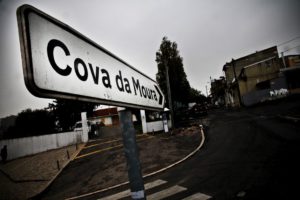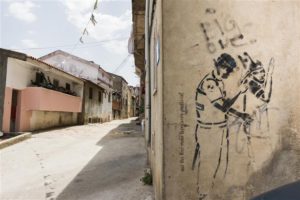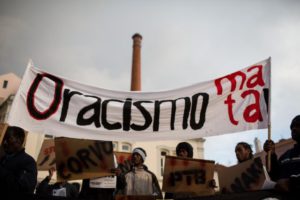Crime by immigrants hasn’t increased. Crime against them has.

The idea that an increase in immigration brings more crime is a myth! This concludes the sociologist Catarina Reis Oliveira, who analyzed the data on crimes published by the police authorities and crossed them with the immigration figures.

In an analysis made at the request of the newspaper Público the result is clear: in municipalities with the highest absolute number of foreigners, crime has decreased. On the other hand, the ratio of crimes per number of residents is lower in the municipalities where the immigrant population has the most impact.

Municipalities where the immigrant population has a significant impact on the resident population are Vila do Bispo (immigrants represent 44% of the total population), Odemira (42%), Lisbon (29%) and Porto (14%).

If there were a direct relationship between immigration and crime, it would be expected that the increase in foreigners would be directly reflected in an increase in crimes recorded. However, ‘nothing more wrong,’ concludes the researcher.

Odemira – where almost half of the population originates from South Asia to work in agriculture – has over the last decade a lower proportion of crimes than that verified for the whole country, also distancing itself from the proportion of crimes recorded by total residents in Lisbon and Porto, municipalities that have a much lower impact of foreign residents.

In Odemira, in ten years, the proportion of crimes per inhabitant hardly changed (from 3.2 crimes per 100 residents in 2011 to 3.4 in 2023), whereas immigration skyrocketed. The data are much lower than in Lisbon and Porto, where the ratio last year was, respectively 5.9 and 5.8 crimes per 100 inhabitants.

What this analysis reveals is that ‘alarmist discourse is not supported by numbers’. In municipalities where the immigrant population hasn’t increased, crime has grown. In contrast, in places like Odimira, where the weight of immigrants is much higher, ‘crime numbers remain stable, even below the national average’.

The researcher concludes that ‘this deconstruction of the myth is essential to combat prejudice and hate. What really worries is the effect of this fallacious discourse, which is fostering an increase in violence against this vulnerable population.’
Enjoy the week Approveite a semana (pic Público)







 Het Openbaar Ministerie heeft – na 2 jaar onderzoek – 18 politieagenten beschuldigd van raciaal geweld, ernstig letsel, marteling, valsheid in geschrifte en ontvoering van 6 jonge Afro-Portugezen in Cova de Moura, een van de oudste en grootste achterstandswijken van Lissabon, met 7000 inwoners, de meeste afkomstig uit Kaapverdië.
Het Openbaar Ministerie heeft – na 2 jaar onderzoek – 18 politieagenten beschuldigd van raciaal geweld, ernstig letsel, marteling, valsheid in geschrifte en ontvoering van 6 jonge Afro-Portugezen in Cova de Moura, een van de oudste en grootste achterstandswijken van Lissabon, met 7000 inwoners, de meeste afkomstig uit Kaapverdië. Als ze – na voorgeleid te zijn aan de onderzoeksrechter in Sintra – bij gebrek aan bewijs vrij komen, doen ze aangifte van marteling en racistisch geweld. Intern onderzoek bij de politie levert daarvoor onvoldoende aanwijzingen op en twee agenten worden licht gestraft – een wordt overgeplaatst en de ander 6 maanden geschorst. De overige blijven gewoon dienst doen in de wijk.
Als ze – na voorgeleid te zijn aan de onderzoeksrechter in Sintra – bij gebrek aan bewijs vrij komen, doen ze aangifte van marteling en racistisch geweld. Intern onderzoek bij de politie levert daarvoor onvoldoende aanwijzingen op en twee agenten worden licht gestraft – een wordt overgeplaatst en de ander 6 maanden geschorst. De overige blijven gewoon dienst doen in de wijk. ‘Institutioneel racisme wordt in stand gehouden door een van de grootste leugens die we onszelf voorhouden, namelijk dat Portugal in het – koloniale – verleden amper racistisch geweest is’, zegt Joana Mortágua, parlementslid van het Links Blok. ‘Dat belemmert integratie.’ [
‘Institutioneel racisme wordt in stand gehouden door een van de grootste leugens die we onszelf voorhouden, namelijk dat Portugal in het – koloniale – verleden amper racistisch geweest is’, zegt Joana Mortágua, parlementslid van het Links Blok. ‘Dat belemmert integratie.’ [ 
